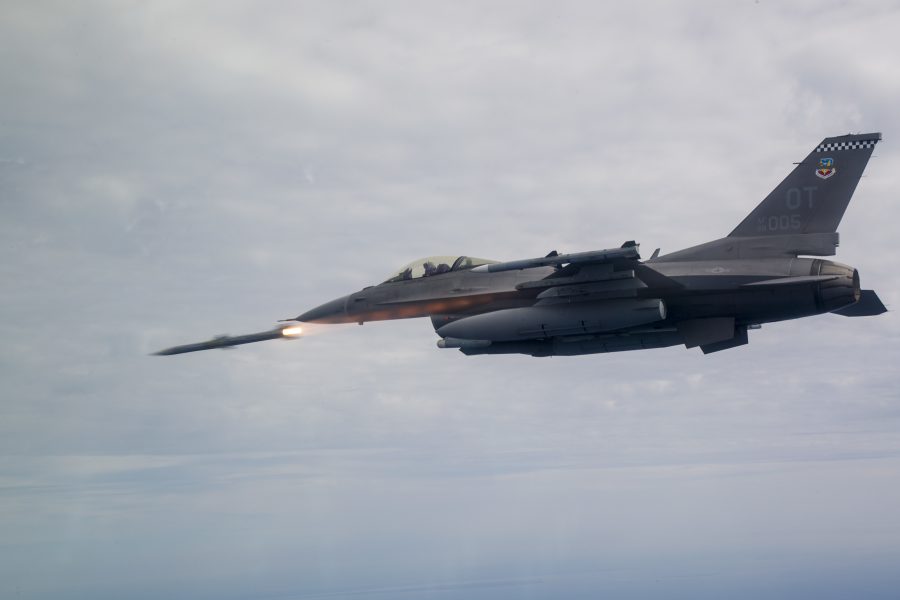Top experts and observers stressed the importance of air superiority in Russia’s ongoing invasion of Ukraine during a Sept. 26 forum in Washington D.C.—and pushed hard for the U.S. to supply Ukraine with advanced weapons as quickly as possible.
Howard Buffett, chairman and CEO of the Howard G. Buffett Foundation, and Michael O’Hanlon, senior fellow and defense analyst at the Brookings Institute, shared their opinions during the the 2023 Knight Forum on Geopolitics.
Buffett in particular focused on air superiority, a hotly debated topic during the conflict. Russia has used drones and cruise missiles to bombard Ukrainian forces and cities, while Ukraine has used air defense systems to down dozens of manned Russian aircraft.
Ukraine’s air force, however, has been unable to control the skies with its smaller Soviet-era fleet, and the U.S. only recently agreed to expedite the transfer of American-made F-16s despite months of requests from Ukrainian leadership—and it will likely be months before those fighters are ready. In the meantime, Ukraine’s counteroffensive has ground out small but steady gains at a high price.
“We’re asking Ukraine to fight in a way we’d never fight,” Buffett said. “In the Gulf War, we flew thousands of sorties for several weeks, dropping 88,000 tons of bombs before we sent a tank or Soldier forward. Our country would not engage in a war without achieving air superiority. … So, the idea that you’d expect Ukraine to go on the counteroffensive without the right equipment and support? Our strategy appears to allow Ukraine to fight and die but not to allow Ukraine to fight and win.”
Ukrainian President Volodymyr Zelenskyy visited Washington D.C. last week, pressing for more aid including long-range missiles. During the visit, the Pentagon announced a $325 million aid package which included more artillery, ammunition, anti-tank weapons, and air defense systems.
According to multiple media reports, President Joe Biden did tell Zelenskyy that Washington will provide Kyiv with the U.S.’s Army Tactical Missile System (ATACMS). That announcement has not been made official, however.
ATACMS can be fired from a mobile launcher with a range of around 100 and 190 miles depending on the variant. Some of the models carry cluster munitions, which are small bombs that scatter over a large area when they explode. Kyiv has repeatedly asked the Biden administration for the long-range missiles to help attack and disrupt supply lines, air bases, and rail networks in Russian-occupied territory.
During Zelenskyy’s visit to D.C., Pentagon Press Secretary Air Force Brig. Gen. Patrick S. Ryder said the Pentagon is anticipating an arrival of several Ukrainian pilots in the U.S. for English-language courses, which will be followed by F-16 training at Morris Air National Guard Base, Ariz.
Pentagon officials have frequently cautioned that certain weapons systems like the F-16, ATACMS, or the M1 Abrams tank will not be “silver bullets” for Ukraine. And during the forum, O’Hanlon cautioned that it is challenging to predict the precise impact of such weapons. But that does not mean they are not worth providing, he added.
“As a defense analyst, I don’t know how well it would work once we provide the F-16s and the ATACMS, but I think we owe it to the Ukrainians to give them a try,” O’Hanlon said. “Because in pure defense analyst terms, it’s pretty hard to predict what the effects will be of any additional, incremental increase in assistance. But we don’t know that they’ll fail either.”
The debate over America’s aid to Ukraine has reached another pivot point in recent weeks, as U.S. lawmakers consider the fiscal 2024 budget. Buffett also noted that Zelenskyy’s approval ratings are declining as the conflict persists, and he argued there are critical supplies and support that should have been delivered to Ukraine sooner and in greater quantities. Highlighting the need to understand Russian President Vladimir Putin’s motivations, he argued Putin’s pursuit of expansion poses a continuous threat to Ukraine and the stability of Europe.
“If you understand Putin—and he’s giving you plenty of history to understand him—when you show weakness, or you play into his hand the way the U.S. did in the last NATO conference, you are just emboldening him,” said Buffett. “And knowing the fact that Putin won’t stop, I think that it’s as much of a fact as you can state, he’ll be on the doorstep of Europe when Ukraine falls, and we’ll be fully engaged because we can’t abandon our most important allies.”
Buffett further argued that the U.S. and its allies’ current approach sets Ukraine up for potential stalemate when they should be pushing for victory.
“I believe we could have ended this war in three to four months if that’s what we had decided to do as the U.S. and allies,” Buffett said. “I see how poorly Russians were prepared in the beginning. However, we gave them a chance to regroup. We gave them a chance to think about their mistakes and learn from their mistakes. So if we continue to do what we are doing, if we continue at the same level we’re doing it, it’s not enough for them (Ukrainians) to win. And why would we continue to invest in something, that we’re failing to provide what it takes to win. That’s not very smart. We need to step it up now, give them what they need, so they can gain air superiority.”
